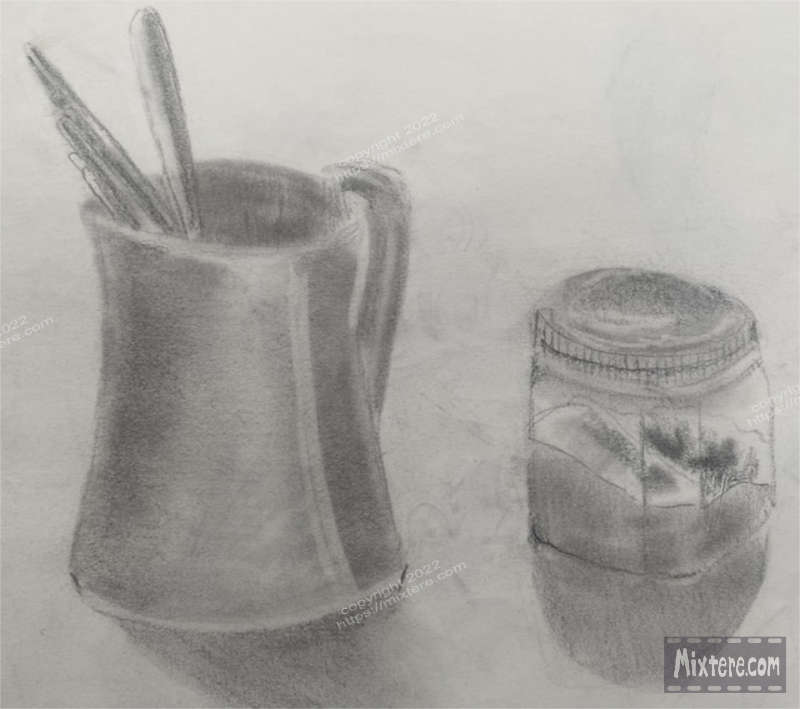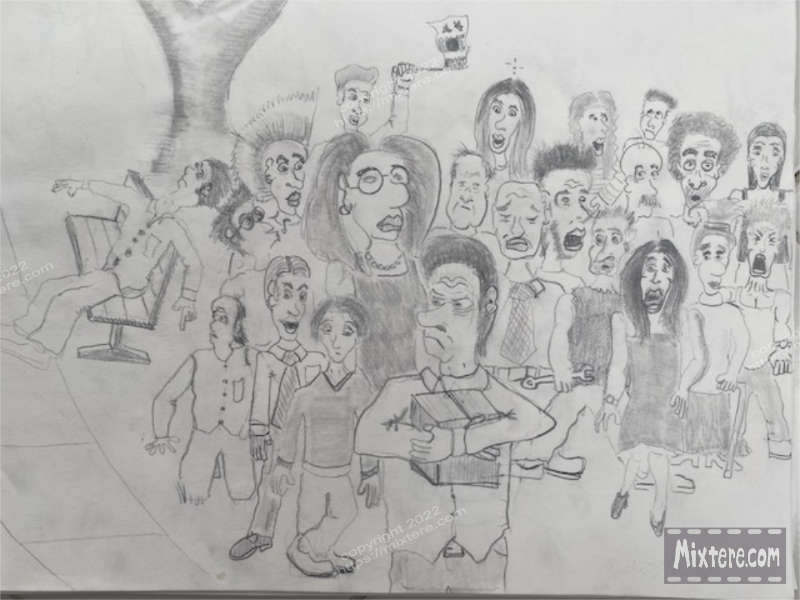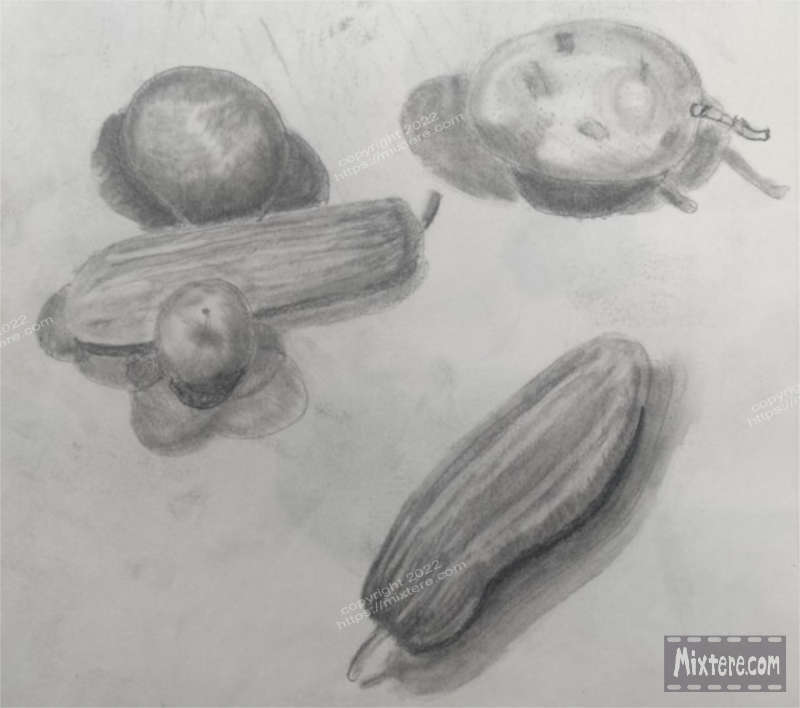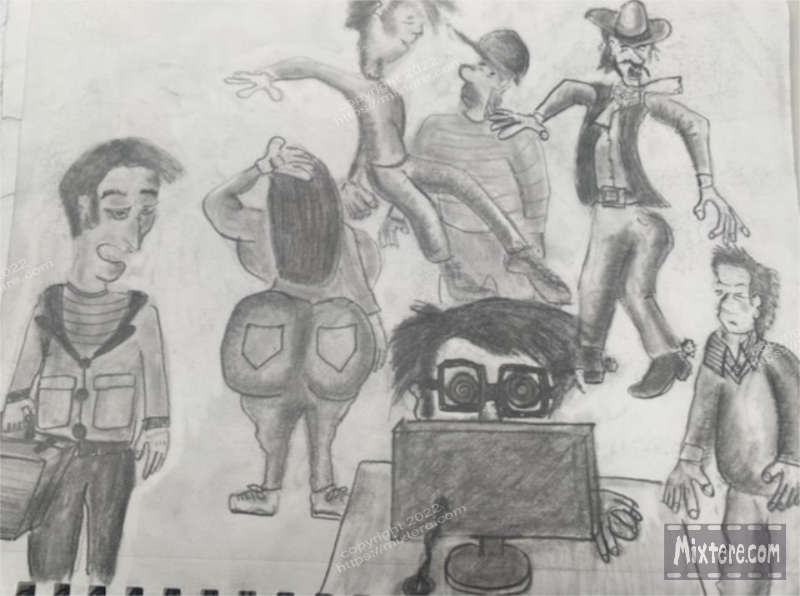
There is something special about paper and pencil. Although a pen feels really good rolling along, there is a permanency to pen that can stifle improvisation. It can be hard to freely create with such a permanent tool. Pens can be good for quick and final creations but pencil allows the most freedom. It can be erased, marked faintly or darkly, shaded, smudged, reworked, etc. Because of this I believe pencil and paper are some of the most helpful tools to connect with the raw creative genie within. Like most of you, a digital device is my constant go to throughout the day. But in the last few years I have been making more and more effort to move away from trying to create on a device.
With a pencil and paper, the artist will not be bothered with the constraints, distractions and controls inherent in devices and the software they access. A pencil will not interrupt you with a notification. A pen will not tell you that the paper is no longer compatible with it. The paper will not prevent you from accessing what is already created upon it, as all design programs do through time. Working on paper is physical activity. You are holding and touching something and it can be very soothing. In approaching these tools the human is interacting with other basic organic elements: graphite or ink, the texture of the paper, and natural forces like temperature, moisture, and light from the sun or a lamp.
I read about a statement made by NASA that paper is the most reliable media and least likely to become obsolete. They noted that in time, the device, software and language used upon it becomes lost or incompatible with newer systems or system operators. Paper does not stimulate the eyes with the brightness of a led display, with sounds and notifications that trigger dopamine squirts, and dependence, in the human system.
Because it is such a raw, direct creative tool, paper can feel infinite and daunting. There is nothing quite like staring at that blank sheet before beginning writing or drawing. Before you is blank space. The only limitations are the paper's physical dimensions or a spilled liquid. Once the artist turns to a blank page they have an instant ability to begin completely from scratch. Whatever limitations the artist then experiences are coming from the mind or body, not from the tools. This is not true of digital devices.

The reason I have tried to take time off from these devices each day is I have noticed that they can easily kill creative focus and inspiration. I feel that in time, device use will always produce these results. I marvel at how this is not noted or valued by the majority. Is this because they are younger and didn't grow up creating on paper? Perhaps. But I have noticed that these devices and what is going on on the screen, are hard to tear oneself away from. The "user" develops a dependence on them. This is also not adequately noted by the architects of these systems, or the users of them. It strikes me now that computer "user" could be equated to drug user. Both are interacting with something that powerfully affects their mind and body. Both drugs and computers can cause stimulation, release dopamine, create dependence and addiction. But like with cigarettes or coffee or alcohol or any other thing with very powerful entities behind them... the truth about them does not often reach to public. This is because it would affect the bottom lines of these powerful forces.
But we must live in this modern world. Device use may not be able to be eliminated but it can be significantly reduced. And I have noticed that when it is, more space opens up in one's consciousness. One's attention span and focus increases a little. And it's more social than a device, despite whatever "connections" are claimed. If you had a pencil instead of a phone in your hand and there are people about you, you are more likely to be interacting with them. I believe this applies to any non-device activity. And simpler machines, like a stereo, are less invasive to. For instance, when a record or a cd is put onto the stereo, unless you are a dj that is a done deal. You don't stand in front of the components, tweaking knobs and concerning yourself with changes and settings and infinitely wanting more from the system. That is not the case when listening to music on a phone or a computer. These devices seem to create a stimulating static in the brain that, when stopped, compel the "user" back for more. You've had that feeling after a movie or video session is suddenly over. You have plopped off a ride into a void. You are so stimulated that things are too quiet. You have been away from quiet too long and your brain is in "consume stimulation" mode. There's a withdrawal. If one can ride it out, one can make it back to the other side; one of humaneness. Using these devices increase the frequency and speed of thought activity. As an artist, it can be frazzling enough just trying to realize a creative vision before it is lost. But having that vision amplified, distorted then interrupted by a computer seems to be a sure way to lose touch with the creative flow. Not so with paper. It is easy on the eyes. The pencil just sits there at the ready till you take it up in your hand. There are no beeps and blinking lights and no charging requirements. With paper, there is no glowing surface, stimulating and drying your eyes out.
What I have noticed about hand written writing is that more thought is put into what words are written. Less, if any, energy is spent editing on the fly. It's just too much work to try to do too much. For this reason, and because my left hand smudges pencil-written words horribly, I often choose a pen to write by hand. It is almost impossible to edit as you write. What is written stays written, and I move on to the next sentence. This is helpful to get first drafts out, instead of having them infinitely delayed in an endless stream of editing that never allows the draft to be completed. For these reasons some writers choose a dumbed down device to write with, like an "alpha smart" or a typewriter. This allows the use of a keyboard without all that other junk.

I like to draw and after becoming lost in frustration with digital art, I have returned to paper. About ten years ago I started to regularly trace my hand-drawn cartoons into vector graphics programs. There are many benefits to this and a professional would be hard-pressed to produce without using these programs. But what I noticed was that, like with writing on paper, I came to value my hand drawing much more than my polished, finished vector artwork. Now I am in a sort of transition phase, drawing with both mediums. I am more and more "drawn" to paper because it is more of a calming, real experience. And what is there is there, especially if ink is involved. With the graphics programs there is constant tapping and selecting and copying and undoing, saving of multiple versions and formats, exporting, importing and endless tweaking. There are constant engineering demands on the brain that interfere with my creative flow. It led to me getting more and more irritated when I was trying to create. I would grow to resent the screen, keyboard and trackpad/ or tablet. Eventually, eyes hurting and my fingers sore and fed up with the fiddling, tapping, dragging- I quit in frustration. Ironically, what I was doing was trying to reproduce the drawing I had put down on paper, by recreating it within the screen. Trying to create from the beginning, on the screen, always fell short. Quality, flow and character were always missing. The drawings had no soul. You can also lose a lot of time and energy when digital tools or software becomes phased out, incompatible, etc. Pencil and paper will not do that to you.
The creative magic waiting on paper always brings me back. Its simplicity and vastness overwhelms, delights and then calms and centers me. Pencil and paper help me to reconnect with the creative genie within. These tools are always ready. They does not need to be turned on. There are no files to create or find. There are no updates, no internet needed. Then, ten or twenty years down the road, long after my computer system can no longer open files I created, I can look back on what I wrote or drew on paper. There, perhaps a little faded with the years, is the magic.


